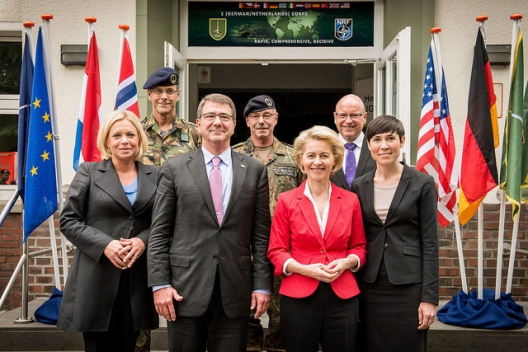 NATO’s responses over the last year have been reactive and by definition (when measured by budgets) temporary. So the question NATO leaders must answer — and that [Secretary of Defense Ash] Carter should push at next week’s ministerial meeting – is to decide how to transition these steps into a sustainable, fully-resourced “new normal.”
NATO’s responses over the last year have been reactive and by definition (when measured by budgets) temporary. So the question NATO leaders must answer — and that [Secretary of Defense Ash] Carter should push at next week’s ministerial meeting – is to decide how to transition these steps into a sustainable, fully-resourced “new normal.”
And this is where things get complicated….
At the most abstract level, the biggest divide lies between Europe’s East and South. For good reason, the Baltics and Poland see Russia as the predominant threat, something that Carter will hear in spades when he meets with his three Baltic counterparts gathered in Estonia. But they compete for attention with those on NATO’s southern tier who are more worried about the refugee crisis, which is the worst in Europe since World War II.
More specifically, the top European contributors to NATO’s defense are on a different strategic page. The UK is consumed by its own existential question about its future in the EU, as well as a defense budget that is being drastically cut. France has emerged as one of the most reliable and steadfast defense partners but is intensely focused on Africa’s Sahel, where it has over 3,000 troops deployed. Italy also worries mostly about the crisis to its South, especially Libya, where it has seriously talked about inserting a peacekeeping force. Poland is seized with the threat from Russia, as its 18 percent increase in defense spending this year shows.
And Germany, which has asserted itself as Europe’s leader on Ukraine, still wrestles with the role of its military in projecting German influence. As I have argued earlier in Defense One, German Defense Minister Ursula von der Leyen is one of Europe’s most interesting (and active) defense leaders, and has emerged as one of Carter’s closest counterparts. Carter will be the first U.S. defense secretary to visit Berlin in nearly a decade, where he will deliver the main policy speech of his trip.
These divisions—between East and South, about competing priorities and interests—create a strategic cacophony that raises questions about Europe’s ability to sustain its end of the bargain in providing for a shared defense. For all the Alliance has accomplished in the past year to show its resolve, and for all the earnest rhetoric about common purpose, how these tensions are managed will define the transatlantic relationship. As Henry Kissinger put it nearly four decades ago, the alliance must be held together by more than “the highest common platitude.”
Derek Chollet is a Defense One contributor. He is also counselor and senior advisor for security and defense policy at the German Marshall Fund of the United States.
Image: Defense ministers of the Netherlands, US, Germany, and Norway, June 22, 2015 (photo: Erik Morren, German/Netherlands Corps)
